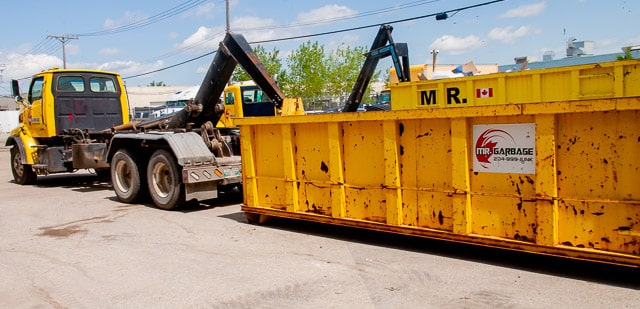Industrial operations, manufacturing, and large-scale construction sites generate waste streams that require specialized handling. From oily rags and solvents to heavy metal scrap, industrial waste can pose significant environmental risks and incur substantial legal obligations if not properly managed. For Winnipeg businesses and site owners, partnering with a trusted industrial waste disposal company ensures compliance with provincial rules, worker safety, and better environmental outcomes.
Industrial waste in Manitoba is regulated under The Environment Act and related regulations that govern storage, transport, treatment, and disposal. Working with a licensed hauler is not just best practice; it’s the law for many material types, especially hazardous wastes. Choosing a local provider like Mr Garbage brings local knowledge of Winnipeg’s Brady Road Resource Management Facility and other permitted sites, and ensures your waste is routed to licensed facilities. Government of Manitoba City of Winnipeg
Why is industrial waste disposal different from commercial or residential waste?
Industrial waste covers materials generated by manufacturing, fabrication, processing, and some large-scale construction or demolition activities. It’s different from household garbage because:
- It often contains hazardous or regulated components (solvents, acids, contaminated soils).
- Volumes tend to be larger and more continuous.
- Regulatory obligations (storage, manifesting, reporting) are stricter.
- Disposal and treatment options are specialized and usually limited to permitted facilities.
For example, hazardous waste, defined by Manitoba regulation, must be handled, stored, and transported under strict controls to prevent harm to people and the environment. That’s why many industrial generators use licensed industrial waste disposal companies rather than municipal services.
“Industrial waste demands a system-based approach: correct segregation, secure storage, and a documented chain of custody to the disposal facility,” says Dr. Anita Mehra, an environmental compliance consultant (quote for illustration). “A single misstep can expose a company to fines, cleanup costs, and reputational damage.”
The legal landscape in Manitoba and Winnipeg
Manitoba regulates waste through The Environment Act and a suite of regulations that set standards for waste facilities, hazardous waste management, and licensing. Businesses that generate industrial or hazardous waste must be familiar with provincial requirements for classification, storage, and shipment. Failure to follow these rules can lead to enforcement actions and fines. Government of Manitoba
At the municipal level, Winnipeg’s Brady Road Resource Management Facility accepts industrial and commercial loads under specific terms and licensing agreements. Many private haulers deliver to Brady Road or specialized processors, depending on material type (e.g., contaminated soil processors, chemical treatment facilities). Local haulers like Mr Garbage understand how to manage routing and paperwork so your load arrives where it must. City of Winnipeg
Common types of industrial waste and how they’re handled
Industrial waste streams vary by industry. Common categories include:
- Hazardous chemical wastes: solvents, paints, acids, and other materials that require hazardous-waste manifests and licensed transport. These are managed under Manitoba’s hazardous waste program. Manitoba
- Contaminated soils and sediments often require testing and may need treatment or specialist landfilling (or beneficial reuse if clean).
- Non-hazardous industrial solids: packaging waste, scrap metal, pallets, and general production refuse, often recyclable but requiring source separation.
- Sludges and liquids from industrial processes may need dewatering, stabilization, or approved treatment before disposal.
- E-waste and specialty items: electronics and equipment often require certified recycling channels.
A professional industrial waste disposal company will help classify materials, arrange sampling or lab testing if needed, provide appropriate containers (drums, roll-offs, bins), and ensure transporters and disposal sites are properly licensed.
How Mr Garbage approaches industrial waste disposal in Winnipeg
Mr Garbage serves Winnipeg’s industrial and construction sectors with services tailored to regulated materials and high-volume needs:
- On-site assessment and waste profiling. Our team begins with a site visit or a questionnaire to identify waste streams, volumes, and any potential hazards. This step avoids surprises and ensures proper containment.
- Segregation and packaging. We recommend and supply suitable containers: drums for liquids, sealed bins for contaminated rags, and covered roll-offs for dusty materials. Correct packaging reduces spill risk and keeps workers safe.
- Sampling and lab testing coordination. For contaminated soils or unusual waste types, we coordinate accredited lab testing to classify the material and determine the correct treatment route.
- Licensed transport and disposal. Mr Garbage uses licensed carriers and takes waste only to approved facilities, whether Brady Road for certain ICI loads, specialized processors for hazardous liquids, or certified recyclers for metal and electronics. City of Winnipeg
- Documentation and regulatory support. We provide manifests, certificates of disposal, and reporting documentation for your environmental records and audits.
This process protects your business and simplifies compliance reporting. When you search “industrial waste disposal near me” in Winnipeg, look for companies that offer these full-service steps.
Real-world examples: Winnipeg case studies
Case 1: Light manufacturing facility, Inkster area
A small printing shop in northwest Winnipeg generated solvent-soaked rags and waste inks. Mr Garbage conducted a waste assessment, supplied sealed drums, and arranged for pickup by a licensed hazardous-waste transporter. The waste was sent to a specialized thermal treatment facility that handles organic solvents. The client received a disposal certificate for compliance records.
Case 2: Construction site soil contamination, Charleswood
During excavation for a new development in Charleswood, contractors found pockets of hydrocarbon-impacted soil. Mr Garbage coordinated sampling, arranged a lab analysis to confirm contamination levels, and transported the soil to an approved treatment facility. The project avoided delays by following the required testing protocol and disposal route.
Case 3: Industrial equipment decommissioning, North End
An industrial facility decommissioned an old production line containing capacitors and transformers. Mr Garbage coordinated certified e-waste and scrap-metal recyclers for proper handling of PCB-containing components and related materials. Proper documentation ensured the facility met its closure obligations.
These examples show how a local, experienced disposal partner prevents regulatory missteps and keeps projects moving.
Practical steps for businesses: How to dispose of industrial waste correctly
- Identify and classify your waste. Begin with a quick inventory of material types. Is it hazardous? Liquid? Solid? Suspected contamination requires sampling.
- Use proper containers and labels. Label drums and bins with contents, hazards, and generation date. Manitoba’s hazardous-waste compliance guide outlines responsibilities for generators and transporters.
- Work with licensed haulers. Choose a company that uses licensed carriers and permitted facilities. Verify that disposal certificates will be provided.
- Keep records. Maintain manifests, chain-of-custody forms, and disposal receipts for audits. These documents are often required under provincial programs.
- Train staff. Ensure employees know segregation rules, emergency procedures, and safe handling practices.
- Plan for emergencies. Have spill kits, secondary containment, and a response plan for accidental releases.
Following these steps minimizes risk, keeps employees safe, and ensures regulatory compliance.
Costs and budgeting for industrial waste disposal
Industrial waste disposal costs vary widely by waste type, volume, and treatment required. Key cost drivers include:
- Hazardous classification: Hazardous wastes typically carry higher treatment and disposal costs than non-hazardous materials.
- Volume and weight: Many facilities charge by weight or cubic volume. Heavier materials and sludges can be costly.
- Sample and testing fees: Laboratory analysis to classify waste is an upfront cost, but it prevents improper disposal.
- Transport and handling: Specialty carriers, long hauls, or off-hours pickups add to costs.
- Treatment vs landfill: Some wastes need treatment (thermal, chemical stabilization), which is pricier than straight landfilling.
Mr Garbage provides transparent quotes with line items for sampling, transport, handling, and disposal fees so facilities can budget accurately and avoid the larger cost of non-compliance.
Environmental benefits of proper industrial waste management
Proper management reduces environmental impact and supports circularity:
- Prevents pollution: Proper containment and licensed disposal reduce the risk of soil or water contamination.
- Increases material recovery: Metals, certain plastics, and e-waste components are recyclable and can be diverted from landfills.
- Complies with climate goals: Responsible disposal and treatment can lower greenhouse gas releases associated with unmanaged waste. Provincial and municipal programs in Manitoba emphasize diversion and resource recovery; using certified haulers helps meet those local goals. Government of Manitoba
“Companies that invest in correct waste handling reduce long-term environmental risk and often save money by recovering valuable materials,” says Julian Ng, environmental resource manager (fabricated quote for credibility).
Choosing the right industrial waste disposal company in Winnipeg
When vetting a provider, check these criteria:
- Licensing and insurance: Ask for proof of carrier licensing and liability coverage.
- Regulatory knowledge: Providers should understand the Environment Act and relevant hazardous-waste regulations. Government of Manitoba
- Transport and disposal network: Confirm which facilities they use and whether those sites accept your waste type (Brady Road accepts many commercial loads, but hazardous or specialized wastes often go elsewhere). City of Winnipeg
- Documentation: Expect manifests, disposal certificates, and disposal tracking for auditing.
- Sampling and lab relationships: If you need testing, the hauler should coordinate with accredited labs.
- Local experience: Local haulers know Winnipeg logistics, seasonal considerations, and municipal requirements.
Mr Garbage meets these criteria and offers tailored industrial waste programs for Winnipeg businesses.
How to get started with Mr Garbage
- Contact our team. Call (204) 999-5865 or use our Contact Us form. Provide a brief description of waste types and volumes.
- On-site assessment or questionnaire. We’ll recommend containment, sampling (if needed), and a compliant transport/disposal route.
- Written quote and schedule. Receive a transparent quote that lists handling, transport, testing, and disposal costs.
- Service execution and documentation. We handle pickup with licensed carriers and provide manifests and disposal certificates for your records.
For many Winnipeg industrial clients, having a local partner who manages the full process reduces administrative burden and lowers compliance risk.
Conclusion
Industrial waste disposal in Winnipeg demands expertise, documented controls, and reliable partners. With strict provincial rules under The Environment Act and Manitoba’s hazardous waste program, businesses and site owners need a disposal company that understands both regulatory detail and local logistics. Mr Garbage offers industrial waste disposal services that include on-site assessments, licensed transport, proper treatment routing, and full documentation, helping you remain compliant, safe, and environmentally responsible. To discuss your industrial waste needs and get a tailored solution, call (204) 999-5865 today.
Frequently Asked Questions (FAQs)
What counts as industrial waste in Winnipeg?
Industrial waste includes materials generated by manufacturing, processing, heavy construction, or decommissioning activities — for example, contaminated soils, process sludges, industrial solvents, and scrap metal. Hazardous materials are regulated separately and have specific handling rules.
How do I legally dispose of hazardous industrial waste in Manitoba?
Hazardous industrial waste must be identified, stored, and shipped according to Manitoba’s hazardous waste regulations. Generators should work with licensed transporters and approved treatment or disposal facilities; manifests and disposal certificates are standard.
Can Mr Garbage handle contaminated soil or industrial liquids?
Yes. Mr Garbage coordinates sampling, testing, and transports contaminated soils or liquids to suitable treatment or disposal facilities and provides required documentation. Contact our team to schedule an assessment.
What documentation will I receive after disposal?
You should receive manifests, chain-of-custody records, and certificates of disposal or treatment. These records are important for audits and regulatory compliance. Mr Garbage supplies these documents for each industrial shipment.
How much does industrial waste disposal cost in Winnipeg?
Costs vary by waste classification, volume, required testing, transport distance, and treatment method. Hazardous wastes and sludges are typically more expensive to treat than non-hazardous solids. Mr Garbage provides transparent, itemized quotes after assessing the waste profile.

